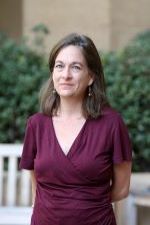Kim Fortun

Kim Fortun, professor of anthropology, studies environmental risk and disaster. She is an interdisciplinary, mixed methods ethnographer specializing in comparative studies of environmental knowledge, injustice and governance. She teaches environmental studies; science and technology studies; and experimental ethnographic methods and research design. She uses experimental ethnographic methods to understand how people in different geographic regions and organizations deal with environmental problems, health risks and major disasters. Kim is particularly focused on industrial disasters – chemical plant explosions and massive breakdown of industrial systems. Her fieldwork has spanned highly populated regions in India and the United States where she’s focused on both catastrophic disasters and more recently on slower moving disasters, including air pollution. Through research, she’s found that that air pollution - recognized as a major killer of people worldwide - has reached catastrophic proportions in India and is responsible for a growing number of health concerns.
Together with her husband and anthropology associate professor Michael Fortun who is also an AirUCI faculty, they’ve found that scientific research on the sources and health impacts of air pollution has consolidated impressively in recent decades, showing that air pollution is not only responsible for a host of respiratory ailments, but may also contribute to conditions like Alzheimer’s and diabetes. New understanding of the significance of air pollution has also transformed approaches to public health, challenging governments at municipal, state, regional and national levels as well as organizations like the World Health Organization. They are especially concerned about compound, intersectional vulnerability and what can be thought of as “combo disaster” resulting from the ways problems in any one system (atmospheric, political, ecologic, technologic) interlace with and exacerbate problems in other systems, such as societal and resource security. Climate change produces especially powerful combo disasters that easily overwhelm available means of understanding and addressing associated problems.
Synergystic Activities
- Editorial Board Member, Political and Legal Anthropology Review (2005-present)
- Society for Cultural Anthropology Task Force on Open Access (2011)
- Committee Member, Section Assembly Advisory Board to American Anthropology Association's Committee on the future of Print and Electronic Publishing (CFPEP) (2011)
- Board Member, Society of Cultural Anthropology (2006-2009)
Environmental problems and disaster, air pollution, history of environmental science and public health, interdisciplinary and international scientific collaboration, India, United States

